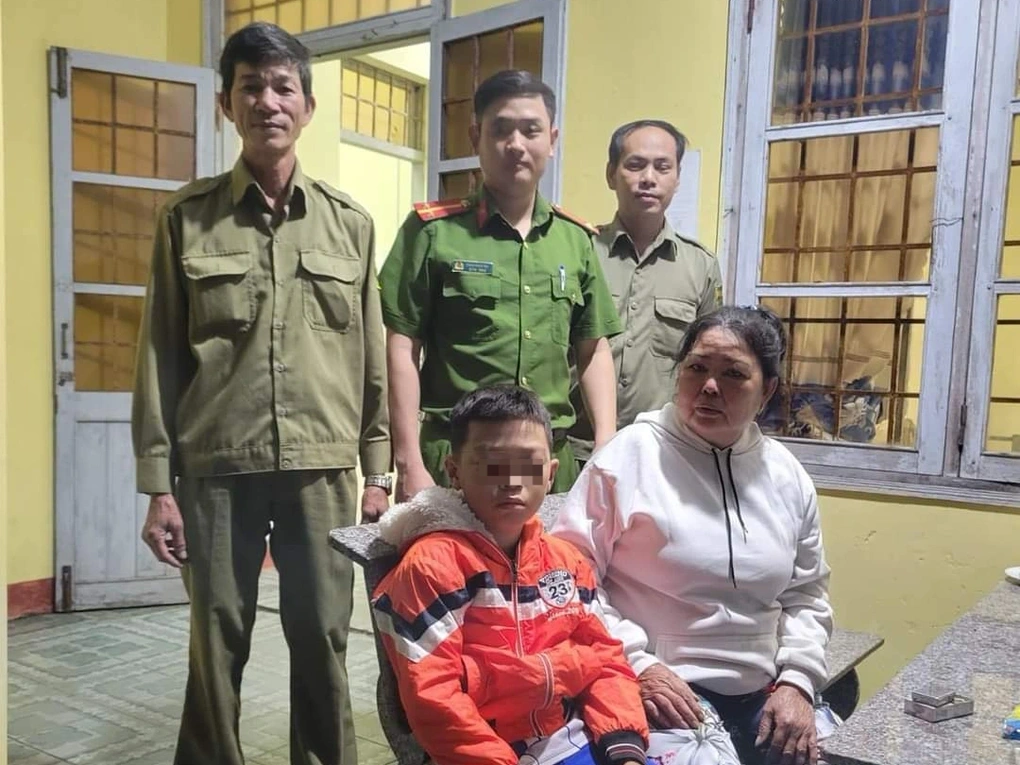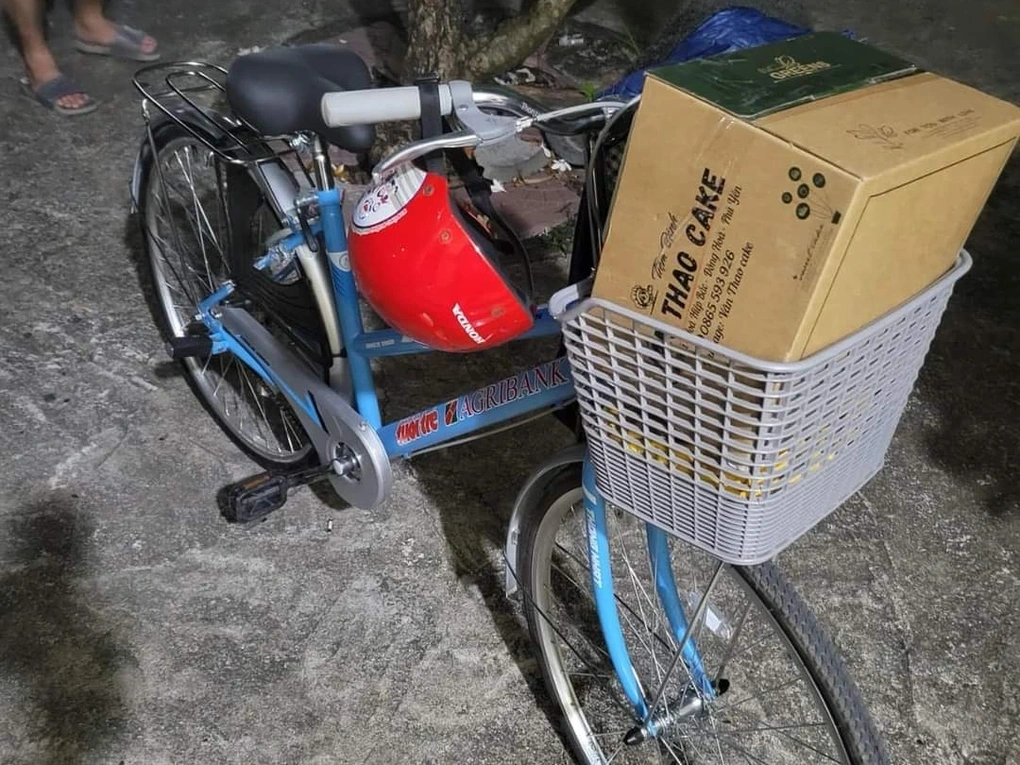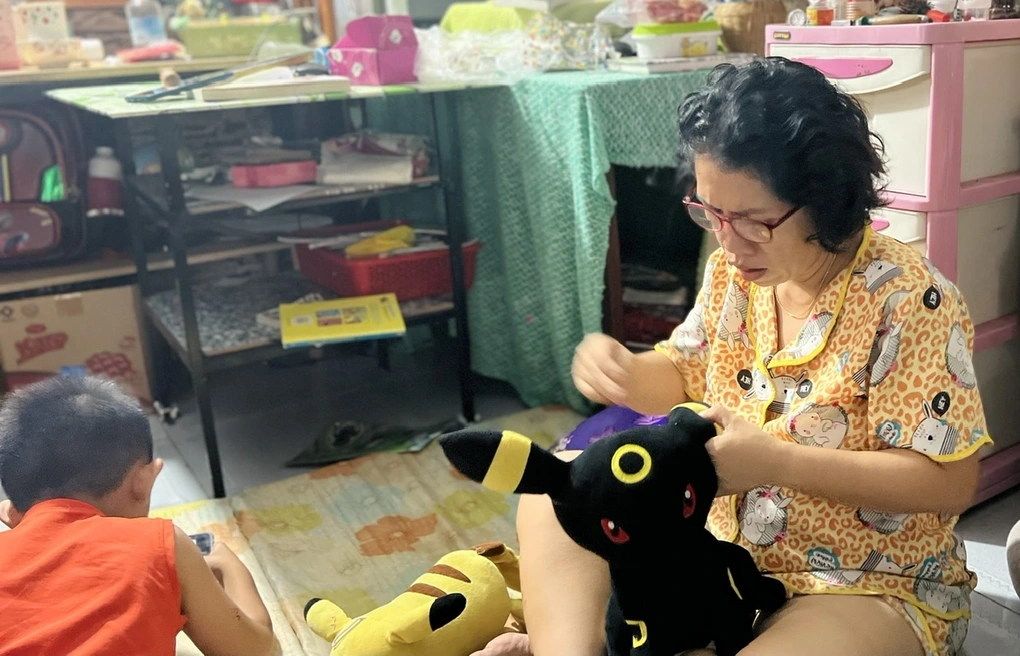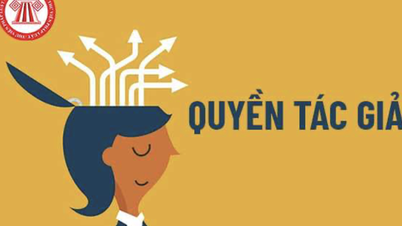In recent days, the image of a 10-year-old boy in Phu Yen cycling to Binh Duong to see his mother has made many hearts ache.

A boy in Phu Yen was found and brought home while cycling, intending to go to Binh Duong to visit his mother (Photo: CACC).
The 10-year-old boy once told his grandmother how much he missed his mother because his mother did not come home for Tet. Longing to see his mother, the boy silently cycled from Phu Yen to Binh Duong, not knowing the roads. He was discovered and brought back while cycling on Highway 29, about 10 kilometers from home.
Like that child, children who have gone through the situation of missing their mother find it difficult to explain the desires and urges within themselves.
Nearly 30 years still haunted... "the barrel misses mom"
Ms. Le Ngoc H., 38 years old, in Ho Chi Minh City, burst into tears when reading the information, looking at the picture of the bicycle of the boy in Phu Yen who was planning to travel to Binh Duong, 400 kilometers away from home, to see his mother. Because she saw herself in it...
In the 4th grade, when she was only 10 years old, due to difficult family circumstances, her parents sent her to live with a relative more than 100 kilometers away.
Mom took her there, said goodbye, and left. The child that year was tough: "I'm fine, you can go home!"
But when his mother's figure disappeared on the village road, H. ran behind his aunt's house and burst into tears. Afraid that people would see him, H. crawled into an open barrel and sat there, hugging his knees, crying until dark...

The bicycle that the child in Phu Yen intended to use as a means of transportation to Binh Duong to find his mother (Photo: CACC).
Every few months or half a year, mother visits H. once. Many times mother makes appointments to pick her up, but month after month, year after year, little H. waits forever...
Ms. H. said that there is no word she has ever learned or heard that can describe the feelings of a child missing her mother. Every time she misses her mother, H. hides in a barrel to cry, to comfort herself...
Many times, H. borrowed her aunt's bike and cycled 10-15 kilometers to the national highway toward her home. H. could not explain why she wanted to go to the national highway even though she knew she could not return home. Maybe it was just to look back at her home and be a little closer to her mother.
After 5 years, when she was in 9th grade, H. was picked up by her parents, but with her rebellious puberty, despite her longing and craving, for her, the mother-daughter relationship had a gap that was difficult to fill.
Recalling his longing for his mother that day, H. said: "Until now, whenever I accidentally see a barrel somewhere, I get chills down my spine and want to vomit."
Also because of those childhood memories, H. was haunted and afraid of separation. Every time her parents or relatives came to visit, on the day they had to say goodbye and leave, she would burst into tears, and then fall into days of depression.
Now, when Ms. H. sees someone leaving their child with grandparents or relatives to take care of, she has a very harsh attitude and reaction. She says as if pleading: "The child has the right to live with his parents, especially the mother, even in difficult and deprived circumstances."
irreparable loss
In the process of healing herself, Ms. MT, 45 years old, in Ho Chi Minh City, realized that her special loss came from having to live away from her mother when she was young. When she was 3 years old, her mother sent her to her grandparents to work far away from home, only coming home on weekends, while her father had been working far away before.
Every Saturday afternoon, the 3-year-old child would go to the crossroads early to wait for her mother to come home by bike. Every time she saw her mother, she was very happy, her cheeks flushed with both joy and sadness. It was not until she was 5 that she was able to live with her mother, and then her father moved to a nearby job.
Nearly ten years ago, Ms. T. still thought her biggest disadvantage was having to live far away from her mother when she was young, not being loved, caressed, or comforted by her mother every day. She also thought that some of her personality traits such as being shy, embarrassed, fearful, and reluctant to interact with others, especially strangers, were due to not living close to her mother when she was young.

Children need to be given priority to ensure the right to live with their parents (Illustration: Hoai Nam).
She also blamed her mother for not letting her daughter live near her when she was young, thinking she was unlucky.
It took decades to heal the memory of being away from her mother, but now Ms. T. can say that "the pain has subsided".
After Tet, workers from the provinces return to industrial zones or go abroad to work, leaving behind their children to be sent to grandparents and relatives.
After the farewell, not only a few months, sometimes parents and children are apart for a whole year, several years when parents do not have the conditions to come home for Tet like the mother of the child in Phu Yen mentioned above. In many cases, when the parents leave, the child is still very small, when they return, the child is already grown up, with all kinds of injuries.
Many studies show that children who are separated from their parents and have a childhood without them suffer many psychological and emotional traumas and may suffer many consequences in the future.
And every summer, the sight of 5-7 year old children being sent by bus to the South to spend the summer months reuniting with their worker parents, spending the summer vacation in cramped rented rooms... also makes many people's eyes sting.
Mr. Nguyen Manh Tuan, a psychologist in Ho Chi Minh City, said that in the situation of having to be away from their children to earn a living, parents need to create connections, communicate, exchange and share regularly with their children. In addition, parents need to have a plan for the time of reunion, let their children know how long they will be apart, and a plan for the reunion so that the children have something to rely on.
However, the expert emphasized that, except in cases of emergency, we need to prioritize the child living with his or her parents. Avoid sending the child to earn money, and when returning... losing the child in one way or another.
"During my consulting work, I have encountered many cases of children having problems such as early pregnancy, falling into social evils, depression, suicide... not living with their parents but with acquaintances, lacking care and sharing," said Mr. Tuan.
Source


































































































Comment (0)